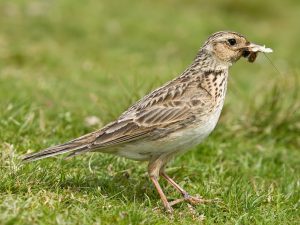Minimal or zero tillage can help increase yields overall, build soil organic matter and improve the use of soil nutrients – and can reduce erosion and benefit farmland birds
.
A popular producer of bird feed also puts together a regular newsletter – and the latest extolls the virtues of drilling rather than ploughing:
.
The last four crops have been direct drilled, so there have been no cultivations so all the trash is on top and the invertebrates come to the surface to eat the trash. As we haven’t been cultivating, we haven’t been killing the invertebrates but the birds are doing their best to reduce invertebrate numbers and I am enjoying seeing all the birds.
Vine House Farm | Wild Bird Food and Bird Feeders Direct | vinehousefarm.co.uk
.
There is a lot of science behind this – as well as UK government agency backing:
.
 Minimum tillage, conservation tillage or zero tillage, are terms given to growing annual crops with minimal or no disturbance to the soil. These techniques involve reducing cultivation depth and can avoid the use of the plough, instead of relying on non-inversion of the soil. As cropping systems are largely influenced by soil structure and soil fertility, it is recognised that minimal or zero tillage can help increase yields overall, build soil organic matter and improve the use of soil nutrients. Recent research carried out for Defra shows that over the long term, organic matter gains may be marginal. At the same time, the presence of crop residues on the surface can reduce erosion and benefit farmland birds by providing a source of invertebrate food and increasing habitat for earlier nesting.
Minimum tillage, conservation tillage or zero tillage, are terms given to growing annual crops with minimal or no disturbance to the soil. These techniques involve reducing cultivation depth and can avoid the use of the plough, instead of relying on non-inversion of the soil. As cropping systems are largely influenced by soil structure and soil fertility, it is recognised that minimal or zero tillage can help increase yields overall, build soil organic matter and improve the use of soil nutrients. Recent research carried out for Defra shows that over the long term, organic matter gains may be marginal. At the same time, the presence of crop residues on the surface can reduce erosion and benefit farmland birds by providing a source of invertebrate food and increasing habitat for earlier nesting.
Cultivations – tillage operations | naturalengland.org.uk
Direct drilling | theriverstrust.org
Action: Reduce tillage | conservationevidence.com
Attractiveness of fields drilled by ‘novel’ methods to birds and small mammals | randd.defra.gov.uk
.